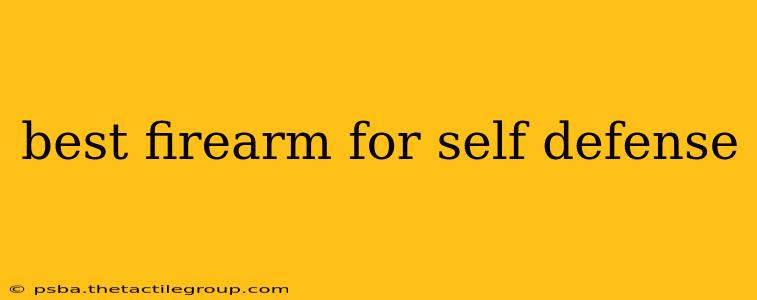Choosing the best firearm for self-defense is a deeply personal decision, heavily influenced by individual factors like physical capabilities, experience level, and lifestyle. There's no single "best" option, but understanding the key considerations will empower you to make an informed choice that prioritizes safety and effectiveness. This guide delves into the crucial aspects to consider when selecting a self-defense firearm.
Key Factors to Consider
Before diving into specific firearm types, let's outline the crucial factors influencing your decision:
1. Personal Physical Capabilities:
- Hand Size and Strength: A larger firearm might be unwieldy for someone with smaller hands, leading to reduced accuracy and control. Consider the grip size and weight carefully.
- Recoil Sensitivity: High-caliber firearms generate significant recoil. If you're sensitive to recoil, a smaller caliber with lower recoil might be a better choice.
- Physical Limitations: Arthritis, limited mobility, or other physical limitations can impact your ability to manipulate a firearm. Choose a design that accommodates your specific needs.
2. Experience Level:
- Beginner: If you're new to firearms, start with something simple and easy to handle, such as a smaller caliber handgun with a relatively manageable recoil. Thorough training is paramount.
- Experienced Shooter: Experienced shooters might prefer more advanced features, like higher capacity magazines or adjustable sights, depending on their specific needs and preferences.
3. Lifestyle and Carry Method:
- Concealed Carry: A compact and lightweight handgun is ideal for concealed carry, minimizing printing (the firearm's outline being visible under clothing).
- Home Defense: A larger firearm, such as a shotgun or carbine, can offer greater stopping power in a home defense situation, though maneuverability within the home needs to be considered.
- Open Carry: State laws vary significantly regarding open carry. If open carry is legal and your preference, choose a firearm that is comfortable to carry openly.
4. Ammunition Considerations:
- Caliber: Choosing the right caliber involves balancing stopping power and recoil. Smaller calibers (.22 LR, .380 ACP) have less recoil, while larger calibers (.45 ACP, .40 S&W, 9mm) generally offer greater stopping power.
- Ammunition Availability: Ensure that the ammunition you choose is readily available and affordable.
Types of Firearms for Self-Defense
Several firearm types are commonly used for self-defense, each with its advantages and disadvantages:
1. Handguns:
- Advantages: Easy to conceal, relatively easy to operate, and readily available.
- Disadvantages: Lower capacity magazines compared to other firearm types, can be less effective at longer ranges.
- Popular Choices: Glock 19, Sig Sauer P365, Smith & Wesson M&P Shield.
2. Shotguns:
- Advantages: High stopping power, effective at close range.
- Disadvantages: Not easily concealed, can be cumbersome to maneuver.
- Popular Choices: Remington 870, Mossberg 500.
3. Carbines (Rifles):
- Advantages: Greater accuracy and range than handguns, higher capacity magazines.
- Disadvantages: More difficult to conceal, require more training to operate effectively.
- Popular Choices: AR-15 style carbines (various manufacturers), Ruger Mini-14.
The Importance of Training
Regardless of the firearm you choose, thorough training is absolutely crucial. This includes:
- Safe Handling: Learning proper firearm safety procedures is paramount to prevent accidents.
- Marksmanship: Developing accurate shooting skills is essential for effective self-defense.
- Legal Aspects: Understanding the laws concerning self-defense and firearm use in your jurisdiction is critical.
Conclusion
Selecting the best firearm for self-defense is a deeply personal and responsible process. Prioritizing safety, understanding your limitations and needs, and engaging in comprehensive training are all vital steps in making an informed decision. Remember to consult with experienced firearm professionals and law enforcement agencies for guidance. This information is for educational purposes only and should not be considered legal or professional advice. Always comply with all applicable local, state, and federal laws regarding firearms.

